Blog
December 22, 2014
Life in the Field- update from the Ruaha Carnivore Project.
By Amy Dickman, Director, Ruaha Carnivore Project
Amy Dickman and the Ruaha Carnivore Project were recently voted into the top 3 finalists at the Tusk Conservation Awards for their innovative approach to big cat conservation, an achievement they have every right to be extremely proud of after all the hard work that has gone into the project. To see the highlights of this year’s awards, click here.
Dangers of life in the bush – carnivore mortalities
Part of RCP’s research is to investigate carnivore mortalities, whether they are caused naturally or by humans. Recently, lodge drivers and guests in Ruaha National Park were lucky enough to witness a pride of lions hunting buffaloes, which are an important prey species in this area. However, they are extremely large and dangerous, and during the hunt, the buffaloes charged and gored two young lions, with fatal results. This is one of the risks of hunting such large prey – but if successful, buffalo hunts provide rich rewards for the entire pride, as a single animal can weigh up to 900kg and would feed the pride for several days.
One of the sub-adult lions killed during the buffalo hunt
Later on in the month, a dead lioness was found on village land near a pond that is frequented by people and livestock. From signs on the carcass, it seems like the lioness was snared, and the head was found apart from the body. The team thought that poachers had cut off the head to get back their snare, as metal snare wire can be hard to get out in the bush so is ‘recycled’ from kills like this one. Most snares are put out to catch antelope like kudu or impala for bushmeat hunting, but predators and other species are often killed in them too. Poaching for bushmeat is a major problem across Africa, especially in very poor communities where meat is a rare and valuable commodity, so improving local livelihoods is a fundamentally important element of long-term conservation.
RCP assistants Mgogo and Justin examining the carcass and taking measurements
Conflict mitigation – reducing attacks
In addition to accidental snaring for bushmeat, local people often intentionally kill large carnivores, mainly because of attacks on their stock. Such attacks can have devastating effects on local households, as livestock is a vital source of both economic wealth and social status. RCP staff members respond as quickly as possible to any reported attacks in the local area so that we can better understand how they occur, and therefore how they can be best prevented in the future. This month, staff investigated several attacks, including one where spotted hyaenas killed one goat and injured another. The goats had become lost in the bush, where they are easy prey for opportunistic carnivores, so improving herder vigilance and livestock husbandry in the bush is a top priority for reducing attacks, and therefore retaliatory carnivore killings.
Spotted hyaenas killed one goat and injured another after they were lost in the bush
Livestock guarding dogs
One method that has proven effective at reducing bush attacks from carnivores is by employing specialised livestock guarding dogs, such as Anatolian Shepherds. RCP is conducting the first trial of these dogs in East Africa, and so far they are doing well. The largest of our dogs, Shujaa, has moved with his herd of goats and cattle to a temporary camp a few kilometers away from his home in Tungamalenga village. Food for livestock becomes more and more scarce towards the end of the dry season and new grazing areas have to be found. As usual we visit him three times per week to ensure he is being taken good care of in this new environment, since this is a physically demanding time for the dogs due to the extended walks with the goats through the bush.
Shujaa eating his evening meal at his temporary camp
One important part of the regular dog checks is weighing them, but this is becoming harder every week for the team! Thankfully the dogs are very used to it and are cooperative, which is useful as they are now getting very large!
RCP staff members Msago and Mgogo weighing a cooperative Hodari, who tipped the scales at an impressive 41kg!
Another important part of the health programme for these dogs is their vaccinations, with disease like rabies a particular concern as it is a serious threat to both animals and humans. This month, we vaccinated all the livestock guarding dogs as well as village dogs, in order to reduce the risk for the dogs, large carnivores (who can be infected by village dogs), and local communities.
One of the Anatolians receiving a rabies vaccination from the local vet
Kitisi clinic provided with medicine due to help from RCP
In order for people to really want carnivores around, it is not enough just to reduce attacks – they have to see important benefits from their presence, which outweigh any remaining costs. Villagers voted that healthcare was one of their most-desired benefits from carnivore presence, so RCP has been working with officials and the local community to equip a healthcare clinic in Kitisi. Thanks to this partnership, the clinic now has its own full-time doctor and nurse, which is very important in this remote area. Recently, the Kitisi clinic was officially registered as a government institution, meaning that it should be able to receive medicines from the government in the future. So far, RCP has been providing medicines and equipment, and this month we provided another three months worth of medicine. To date 1315 patients have been treated at the Kitisi clinic, providing an invaluable benefit for local people.
Dr Samuel Dally and the new Kitisi clinic nurse working with some of the medicines purchased with the help of RCP
Lion Guardian literacy days – lessons under the tree
Another important benefit from RCP’s presence in the local area is the Ruaha Lion Guardians programme, which was developed in partnership with the Kenya Lion Guardians programme and Panthera. This initiative employs and trains young men in conservation-related activities, and enables them to fulfil important roles in the community. Several months ago the Ruaha Lion Guardians established the very popular ‘’Literacy Days’’ as a free education opportunity both for the Guardians and for other pastoralists. Besides the educational aspect, the literacy days help to increase the status of the Guardians and demonstrate additional value of working in conservation.
The Barabaig Guardians studying hard under a tree by camp
George (second from left) teaching English spelling and pronounciation, and teaching animal names in English
Lion Guardian park trips
We had good trips to the park this month with all the Lion Guardians. Our two newest recruits had never been to the park before, so this was the first time that they were able to see lions, elephants and other game so relaxed and at such close proximity. Previously, these new Guardians had only seen lions and elephants briefly on village land, where the scared animals ran away from them, so this was a great opportunity to really watch wildlife and learn about them in close quarters. Very excitingly, we also finally caught up with the resident pack of endangered African wild dogs that some of the Guardians regularly see while out patrolling their zones.
The local pack of African wild dogs that are thriving in our area © Sean McEnery
Lions reproducing! Good news for the lion population in Ruaha © Sean McEnery
Lions displaying their more tender and affectionate side © Sean McEnery
The Guardians in Zones A and B have seen tracks of two mature lions and three sub-adults on many occasions recently. We are hopeful that we may have resident lions in the wilder areas to the north of the villages. Our hope is that these lions will stay around peacefully and continue to avoid killing livestock.
Three of the Guardians have had big community gatherings at their homes this month, where all the young people in the area and the many of the elders assembled for story-telling and cultural “games” that include the famous jumping dances. The reason behind these is in an effort to build even closer relations among the Guardians and the communities in which they work. The hope is that, as a result of the close bonds that develop at these gatherings, the Guardians will start to hear about any lion hunts and lion activity in their areas much earlier and with greater reliability. The idea has seemed to have been successful at this early stage, both the community members and Guardians have responded positively, enjoyed themselves and made new allies.
Visitors to RCP
RCP is lucky enough to receive support from various organisations, such as National Geographic and the safari company Asilia Africa. This month, Erik from Asilia’s marketing department visited RCP to learn more about the project, and generously offered to help us develop marketing materials. In addition, Allison Parrish from Global Adrenaline (a company which works with National Geographic) visited RCP and learned all about our work, so they can better explain to visitors the kind of conservation activities being undertaken in the Ruaha landscape.
Erik and Amanda learning about the guarding dog programme and other RCP activities
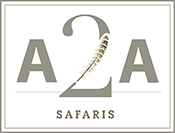
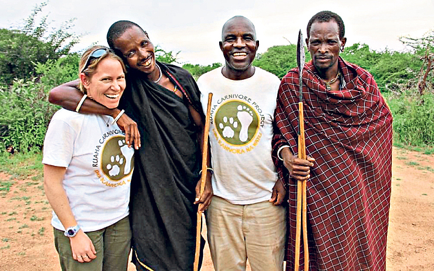
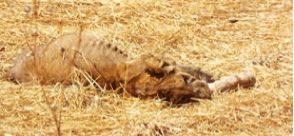
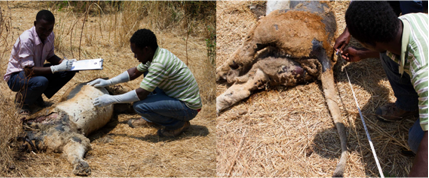
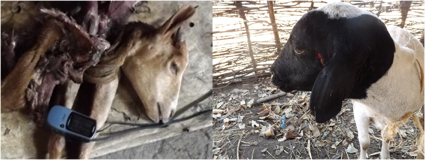
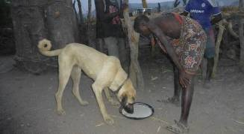
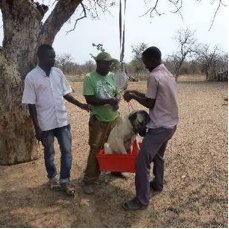
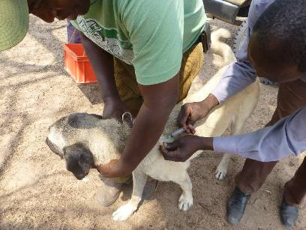
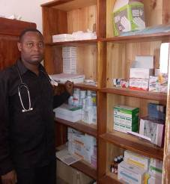
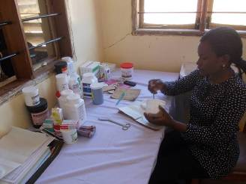
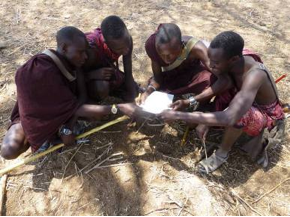
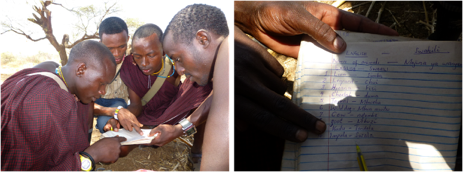
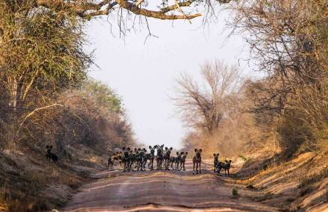
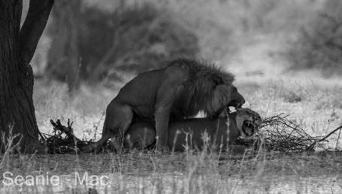
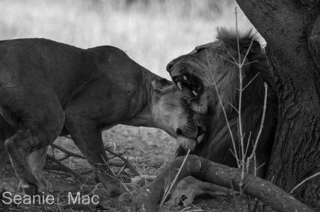
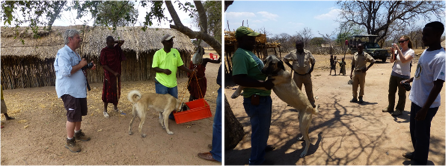




































Add comment
By Amy Dickman, Director, Ruaha Carnivore Project
Amy Dickman and the Ruaha Carnivore Project were recently voted into the top 3 finalists at the Tusk Conservation Awards for their innovative approach to big cat conservation, an achievement they have every right to be extremely proud of after all the hard work that has gone into the project. To see the highlights of this year’s awards, click here.
Dangers of life in the bush – carnivore mortalities
Part of RCP’s research is to investigate carnivore mortalities, whether they are caused naturally or by humans. Recently, lodge drivers and guests in Ruaha National Park were lucky enough to witness a pride of lions hunting buffaloes, which are an important prey species in this area. However, they are extremely large and dangerous, and during the hunt, the buffaloes charged and gored two young lions, with fatal results. This is one of the risks of hunting such large prey – but if successful, buffalo hunts provide rich rewards for the entire pride, as a single animal can weigh up to 900kg and would feed the pride for several days.
One of the sub-adult lions killed during the buffalo hunt
Later on in the month, a dead lioness was found on village land near a pond that is frequented by people and livestock. From signs on the carcass, it seems like the lioness was snared, and the head was found apart from the body. The team thought that poachers had cut off the head to get back their snare, as metal snare wire can be hard to get out in the bush so is ‘recycled’ from kills like this one. Most snares are put out to catch antelope like kudu or impala for bushmeat hunting, but predators and other species are often killed in them too. Poaching for bushmeat is a major problem across Africa, especially in very poor communities where meat is a rare and valuable commodity, so improving local livelihoods is a fundamentally important element of long-term conservation.
RCP assistants Mgogo and Justin examining the carcass and taking measurements
Conflict mitigation – reducing attacks
In addition to accidental snaring for bushmeat, local people often intentionally kill large carnivores, mainly because of attacks on their stock. Such attacks can have devastating effects on local households, as livestock is a vital source of both economic wealth and social status. RCP staff members respond as quickly as possible to any reported attacks in the local area so that we can better understand how they occur, and therefore how they can be best prevented in the future. This month, staff investigated several attacks, including one where spotted hyaenas killed one goat and injured another. The goats had become lost in the bush, where they are easy prey for opportunistic carnivores, so improving herder vigilance and livestock husbandry in the bush is a top priority for reducing attacks, and therefore retaliatory carnivore killings.
Spotted hyaenas killed one goat and injured another after they were lost in the bush
Livestock guarding dogs
One method that has proven effective at reducing bush attacks from carnivores is by employing specialised livestock guarding dogs, such as Anatolian Shepherds. RCP is conducting the first trial of these dogs in East Africa, and so far they are doing well. The largest of our dogs, Shujaa, has moved with his herd of goats and cattle to a temporary camp a few kilometers away from his home in Tungamalenga village. Food for livestock becomes more and more scarce towards the end of the dry season and new grazing areas have to be found. As usual we visit him three times per week to ensure he is being taken good care of in this new environment, since this is a physically demanding time for the dogs due to the extended walks with the goats through the bush.
Shujaa eating his evening meal at his temporary camp
One important part of the regular dog checks is weighing them, but this is becoming harder every week for the team! Thankfully the dogs are very used to it and are cooperative, which is useful as they are now getting very large!
RCP staff members Msago and Mgogo weighing a cooperative Hodari, who tipped the scales at an impressive 41kg!
Another important part of the health programme for these dogs is their vaccinations, with disease like rabies a particular concern as it is a serious threat to both animals and humans. This month, we vaccinated all the livestock guarding dogs as well as village dogs, in order to reduce the risk for the dogs, large carnivores (who can be infected by village dogs), and local communities.
One of the Anatolians receiving a rabies vaccination from the local vet
Kitisi clinic provided with medicine due to help from RCP
In order for people to really want carnivores around, it is not enough just to reduce attacks – they have to see important benefits from their presence, which outweigh any remaining costs. Villagers voted that healthcare was one of their most-desired benefits from carnivore presence, so RCP has been working with officials and the local community to equip a healthcare clinic in Kitisi. Thanks to this partnership, the clinic now has its own full-time doctor and nurse, which is very important in this remote area. Recently, the Kitisi clinic was officially registered as a government institution, meaning that it should be able to receive medicines from the government in the future. So far, RCP has been providing medicines and equipment, and this month we provided another three months worth of medicine. To date 1315 patients have been treated at the Kitisi clinic, providing an invaluable benefit for local people.
Dr Samuel Dally and the new Kitisi clinic nurse working with some of the medicines purchased with the help of RCP
Lion Guardian literacy days – lessons under the tree
Another important benefit from RCP’s presence in the local area is the Ruaha Lion Guardians programme, which was developed in partnership with the Kenya Lion Guardians programme and Panthera. This initiative employs and trains young men in conservation-related activities, and enables them to fulfil important roles in the community. Several months ago the Ruaha Lion Guardians established the very popular ‘’Literacy Days’’ as a free education opportunity both for the Guardians and for other pastoralists. Besides the educational aspect, the literacy days help to increase the status of the Guardians and demonstrate additional value of working in conservation.
The Barabaig Guardians studying hard under a tree by camp
George (second from left) teaching English spelling and pronounciation, and teaching animal names in English
Lion Guardian park trips
We had good trips to the park this month with all the Lion Guardians. Our two newest recruits had never been to the park before, so this was the first time that they were able to see lions, elephants and other game so relaxed and at such close proximity. Previously, these new Guardians had only seen lions and elephants briefly on village land, where the scared animals ran away from them, so this was a great opportunity to really watch wildlife and learn about them in close quarters. Very excitingly, we also finally caught up with the resident pack of endangered African wild dogs that some of the Guardians regularly see while out patrolling their zones.
The local pack of African wild dogs that are thriving in our area © Sean McEnery
Lions reproducing! Good news for the lion population in Ruaha © Sean McEnery
Lions displaying their more tender and affectionate side © Sean McEnery
The Guardians in Zones A and B have seen tracks of two mature lions and three sub-adults on many occasions recently. We are hopeful that we may have resident lions in the wilder areas to the north of the villages. Our hope is that these lions will stay around peacefully and continue to avoid killing livestock.
Three of the Guardians have had big community gatherings at their homes this month, where all the young people in the area and the many of the elders assembled for story-telling and cultural “games” that include the famous jumping dances. The reason behind these is in an effort to build even closer relations among the Guardians and the communities in which they work. The hope is that, as a result of the close bonds that develop at these gatherings, the Guardians will start to hear about any lion hunts and lion activity in their areas much earlier and with greater reliability. The idea has seemed to have been successful at this early stage, both the community members and Guardians have responded positively, enjoyed themselves and made new allies.
Visitors to RCP
RCP is lucky enough to receive support from various organisations, such as National Geographic and the safari company Asilia Africa. This month, Erik from Asilia’s marketing department visited RCP to learn more about the project, and generously offered to help us develop marketing materials. In addition, Allison Parrish from Global Adrenaline (a company which works with National Geographic) visited RCP and learned all about our work, so they can better explain to visitors the kind of conservation activities being undertaken in the Ruaha landscape.
Erik and Amanda learning about the guarding dog programme and other RCP activities